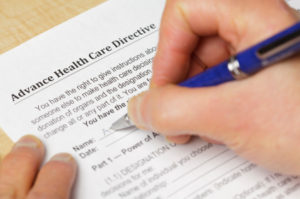
Credit: keiro.org
Our Weekly Tip: Paperwork takes us out of the moment and seems like a bothersome chore to many people. If you’re not one to dwell on your mortality, writing an Advance Directive can get shuffled to the bottom of your priorities indefinitely. However, according to this Huffington Post article, “patients who have planned in advance for the end of their lives spend less time in the hospital, receive fewer intensive treatments, and have greater quality of life when they reach their final days. In addition, their surviving relatives experience less stress, anxiety and depression during the process.”
We at SevenPonds recommend that you create an Advance Directive now, even if you believe you are years away from death. An Advanced Directive gives caregivers who are not familiar with your medical history guidance in an emergency. It also tells first responders and emergency room doctors what kind of treatments you do and do not wish to receive should you be too ill to communicate.

You’re never to young to have a conversation about end of life
(Credit: cityguideny.com)
How-to Suggestion: Ask your family doctor to recommend a resource to help you create an Advance Directive. They will know which form is recognized in your area of residence. Then review your Advance Directive every one to five years, or whenever you feel your worldview or values have changed. Reviewing the document is like checking in with your past self. It helps you notice how you’ve grown or remained consistent, and affirms your autonomy over your bodily care. As you consider your medical wishes, also consider who in your family and inner circle needs to know about them. Check in with people in your support network. This will also give you the opportunity to deepen the bonds between you and the people you love. When your loved ones know your wishes in a medical emergency, the experience will be less stressful for them, too.

 Our Tip of the Week: Regularly Update Your Advance Directive
Our Tip of the Week: Regularly Update Your Advance Directive


 “Help Me, Helen”
“Help Me, Helen”
 Recovering Cremation Remains After the Los Angeles Fires
Recovering Cremation Remains After the Los Angeles Fires
 “As Tears Go By” by Marianne Faithfull
“As Tears Go By” by Marianne Faithfull














